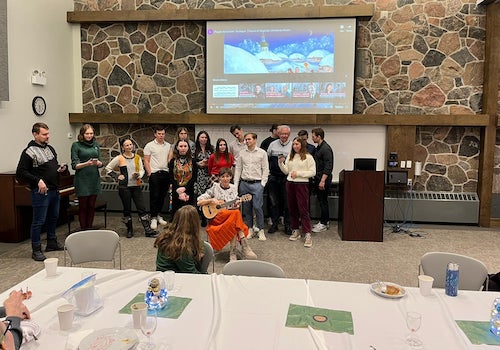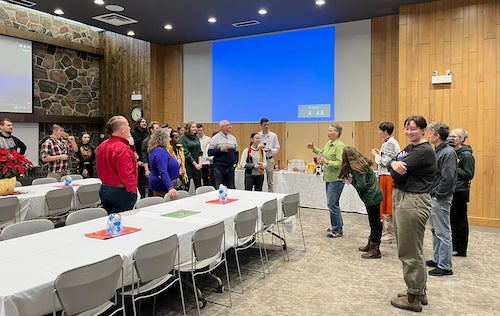Editor:
Brandon Sweet
University Communications
bulletin@uwaterloo.ca
Where there's a challenge, Waterloo is on it

A message from Marketing and Brand in University Relations.
Amid ongoing news of world concerns and issues, Waterloo continues to deliver solutions that are making a positive impact.
Now, and over the next few months, look for Waterloo’s latest institutional brand campaign featuring researchers, entrepreneurs, students and alumni. The first flight of stories includes:
- The Waterloo Institute for Sustainable Aeronautics, led by faculty member, Suzanne Kearns, is collectively working to create a more sustainable future for global aeronautics.
- Ceragen, a biotech company co-founded by Velocity Resident Danielle Rose, is leveraging deep tech to help farmers increase crop yields.
- Vena Medical, co-founded by Waterloo alumni, Michael Phillips and Phillip Cooper, have developed the world’s smallest camera to help surgeons treat stroke patients more quickly.
- MedAtlas, founded by PhD candidate Margaret Mutumba, has launched a digital platform that connects patients to health care specialists across Africa.
- FluidAI, founded by Waterloo grad Youssef Helwa, has created a wireless monitor that detects post-operative complications faster to improve patient outcomes.
In February, a second flight of stories featuring Math, Arts, Engineering and Environment will launch – stay tuned for those details.
Feel free to share these links on LinkedIn and Twitter – and don’t forget to tag Waterloo and/or use the #UWaterloo hashtag.
Nominations open for Honorary Member of the University
Nominations are open for Honorary Member of the University designation, according to a memo circulated to employees this week by the University's president and the chair of the nominating committee.
"The Honorary Member of the University designation recognizes employees for outstanding service to the University as a whole," says the message from Vivek Goel, President and Vice-Chancellor and Lynn Judge, Chair, Honorary Member of the University Committee. "It is the highest honour a staff member can attain at the University of Waterloo. For faculty members, it recognizes distinctive administrative or other service to the University (as distinguished from Distinguished Professor Emeritus, which recognizes academic excellence). These achievements are celebrated at Convocation where they inspire those in attendance."
"We invite you to consider nominating a worthy candidate for this honour," the memo continues. "Please note, the University embraces and appreciates diversity and wants to ensure a diverse pool of candidates. With the community’s input we can continue to maintain a substantial pool of deserving individuals whose achievements the University would be delighted to celebrate and honour."
"Guidelines for the awarding of Honorary Member of the University, including selection guidelines, procedures, considerations to make in assessing a candidate’s qualifications, and details on what to submit in a nomination package, can be found on the website for the Honorary Member of the University Committee. You are also welcome to contact the committee secretary, Tim Weber-Kraljevski (tweber@uwaterloo.ca) for information and assistance."
"While nominations can be submitted at anytime, please submit your nomination by 27 January 2023 to be considered at the next Honorary Member of the University Committee meeting."
"Thank you in advance for your contribution to this important tradition," the memo concludes.
Centre for Teaching Excellence services for winter 2023
As the Winter term begins, the Centre for Teaching Excellence would like to remind everyone about our Winter 2023 programs to support the instructional development of Waterloo faculty, staff, graduate students, and postdoctoral fellows.
Graduate student programs
Graduate students and postdoctoral fellows interested in developing their knowledge and skills as Teaching Assistants and instructors are encouraged to complete workshops from the Fundamentals of University Teaching program. The Fundamentals program introduces participants to evidence-based teaching strategies and provides hands-on opportunities to practice lesson planning and delivery skills. We are offering many workshops throughout the Winter term, held either online in Zoom or on-campus. Participants can take individual workshops, found on the Fundamentals Events website, or work towards receiving the full Fundamentals certificate.
Faculty programs
We have a variety of online and in-person workshops to support Waterloo instructors offered this term. We are excited to offer workshops related to LEARN, assessing student learning, course design (including flipped classrooms), experiential learning, and feature our NEW Indigenous Knowledges Reading Series. You can look forward to the return of a few signature in-person events such as the Waterloo Assessment Institute and the Teaching Excellence Academy. If you prefer to work at your own pace, we have several self-directed workshops available. We will wrap up our Winter term with the Annual University of Waterloo Teaching and Learning Conference (Call for Proposals now open).
If you have any questions about programming please contact cte@uwaterloo.ca.
United College hosts turkey dinner for Ukrainian students

By Rachel Jou-ter Woort.
This holiday season, more than 30 people gathered at Alumni Hall at United College on the University of Waterloo campus for a holiday meal. The event came to life by the hands of Lisa ter Woort, international account manager and business developer with Co-operative and Experiential Education (CEE), who wanted to ensure the Ukrainian students staying at United College had a way of celebrating the holidays when they were not all able to visit family or see friends over the winter break.

With the help of Halyna Padalko, MA student in Global Governance at University of Waterloo, and Harold Godwin, managing director, Waterloo Artificial Intelligence Institute, Lisa planned and executed a turkey dinner on December 26, 2022. Many students who were at United College over the winter break helped prepare the turkeys along with traditional Ukrainian dishes.
“It was absolutely amazing to prepare some Ukrainian salads that each of our students used to eat from our childhood for Christmas,” said Padalko on reflection, “It was something more than just Christmas dinner: it was an exchange of our cultures. We tried to go deeper to understand the history of both countries through our meal and how we prepared it.” Many others brought their own dishes to contribute to the event, such as United College Principal, Rick Myers, and his family, who brought homemade chili.
While people were eating, Ukrainian songs and videos played in the background. Some of these videos were directed by students in attendance at the meal. After dinner, students sang Ukrainian carols including the international classic “Carol of the Bells” written by the Ukrainian composer Leontovych.
A call for submissions for 2023's Open Education Week

A message from the Open Scholarship Committee.
The Open Scholarship Committee (OSC) is calling for contributions to Open Education Week, which will take place from March 6 to 10, 2023. Open education is one of the three main components of open scholarship, alongside open access and open data. Open education comprises digital resources, tools, and practices encouraging open sharing within the educational community around the world, with the goal of improving access to and effectiveness of education and advancing equity and accessibility.
The OSC is looking for contributions, either in the form of activities or resources, grouped around the three prongs of open education: resources (e.g. OER), tools (e.g. H5P, Pressbooks, XR), or practices (e.g. equity, inclusion, decolonization, accessibility, copyright) related to opening education. For the purposes of Open Education Week, “open” refers both to materials that have been published with an open license (e.g. Creative Commons, Ontario Commons) or which have been made publicly available in other ways.
Open Education Week activities will be fully online and could include, but are not limited to, presentations (live or pre-recorded, with attendance to answer follow-up questions encouraged), workshops, panels, or demonstrations. Resources could include, but are not limited to, PDFs, slide decks, websites, books, or AV materials (e.g. videos, podcasts). Keeping with the spirit of open, activities will be freely available to interested parties outside of the University of Waterloo community. In addition, presentations or demonstrations may be recorded and presenters/authors are encouraged to make their materials available to the public under an open license, although neither of these is required.
Submissions are due by February 3, 2023. Applicants will be informed of the committee’s decisions at the beginning of February. Please contact kblair@uwaterloo.ca for further information.
Upcoming office closure
AccessAbility Services, including the Exam Centre, will be closed today from 12:00 noon to 4:30 p.m. for a staff appreciation event.
Link of the day
30 years ago: Star Trek: Deep Space Nine
When and Where to get support
Students can visit the Student Success Office online for supports including academic development, international student resources, immigration consulting, leadership development, exchange and study abroad, and opportunities to get involved.
Instructors looking for targeted support for developing online components for blended learning courses, transitioning remote to fully online courses, revising current online courses, and more please visit Agile Development | Centre for Extended Learning | University of Waterloo (uwaterloo.ca).
Faculty, staff, post-doc and graduate student instructors can find upcoming teaching and learning workshops, self-directed modules and recordings of previous events on Centre for Teaching Excellence Workshops and Events page.
Instructors can access the EdTech Hub to find support on Waterloo’s centrally supported EdTech tools. The Hub is supported by members of IST’s Instructional Technologies and Media Services, Centre for Teaching Excellence, Centre for Extended Learning and subject matter experts from other campus areas.
Supports are available for employees returning to campus. Visit IST’s Hybrid Work and Technology guidelines and workplace protocols to assist with the transition.
Students with permanent, temporary and suspected disabilities and disabling conditions (medical conditions, injuries, or trauma from discrimination, violence, or oppression) can register with AccessAbility Services for academic accommodations (classroom accommodations, testing accommodations, milestone accommodations).
Instructors can visit AccessAbility Services' Faculty and Staff web page for information about the Instructor/Faculty role in the accommodation process. Instructors/Faculty members are legally required to accommodate students with disabilities. AccessAbility Services (AAS) is here to help you understand your obligations, and to offer services and resources to help you facilitate accommodations.
The Writing and Communication Centre has in-person and virtual services to support grad and undergrad students, postdocs and faculty with any writing or communication project. Services include one-to-one appointments, drop-ins at Dana Porter Library, online workshops, writing groups, English conversation practice, and custom in-class workshops.
Research Ethics: Find yourself with an ethical question, unsure if your work requires an ethics review, or need advice about putting together a research ethics application? Reach out to one of our friendly staff by booking a consultation or email us with your questions.
Co-op students can get help finding a job and find supports to successfully work remotely, develop new skills, access wellness and career information, and contact a co-op or career advisor.
The Centre for Career Action (CCA) has services and programs to support undergrads, grad students, postdocs, alumni, and employees in figuring out what they value, what they’re good at, and how to access meaningful work, co-op, volunteer, or graduate/professional school opportunities. Questions about CCA's services? Live chat, call 519-888-4047, or stop by our front desk in the Tatham Centre 8:30 a.m. to 4:30 p.m., Monday to Friday.
Drop-in to in-person Warrior Study Halls on Thursdays from 5:00 p.m. to 6:30 p.m. in DC and DP. Join a Peer Success Coach to set goals and work independently or in groups each week.
Renison's English Language Institute continues to offer virtual events and workshops to help students practice their English language skills.
If you feel overwhelmed or anxious and need to talk to somebody, please contact the University’s Campus Wellness services, either Health Services or Counselling Services. You can also contact the University's Centre for Mental Health Research and Treatment. Good2Talk is a post-secondary student helpline available to all students.
The Library is here to help, both in person and online. Our spaces are open for access to book stacks, study space, computers and printers, and the IST Help Desk. For in-depth support, meet one-to-one with Librarians, Special Collections & Archives and Geospatial Centre staff. Access our resources online for anywhere, anytime learning and research. Full details on current services and hours are available on the Library’s COVID-19 Update webpage.
The Faculty Association of the University of Waterloo (FAUW) continues to advocate for its members. Check out the FAUW blog for more information.
The University of Waterloo Staff Association (UWSA) continues to advocate for its members. Check out the UWSA blog for more information.
The Office of Equity, Diversity, Inclusion & Anti-Racism (EDI-R) works with students, faculty and staff across campus to advance equity and Anti-racism through evidence-based policies, practices and programs. If you have a concern related to Anti-racism and/or equity, please complete our intake form.
The Sexual Violence Prevention and Response Office (SVPRO) supports all members of the University of Waterloo campus community who have experienced, or been impacted, by sexual violence. This includes all students, staff, faculty and visitors on the main campus, the satellite campuses, and at the affiliated and federated Waterloo Institutes and Colleges. For support, email: svpro@uwaterloo.ca or visit the SVPRO website.
The Office of Indigenous Relations is a central hub that provides guidance, support, and resources to all Indigenous and non-Indigenous campus community members and oversees the University's Indigenization strategy.
The Waterloo Indigenous Student Centre, based at United College, provides support and resources for Indigenous students, and educational outreach programs for the broader community, including lectures, and events.
WUSA supports for students:
Peer support - MATES, Glow Centre, RAISE, Women’s Centre - Click on one of the links to book an appointment either in person or online for the term.
Food Support Service food hampers are currently available from the Turnkey Desk 24/7 in the Student Life Centre. Drop-off locations are also open again in SLC, DC, DP, SCH, and all residences.
Co-op Connection all available online.
Centre for Academic Policy Support - CAPS is here to assist Waterloo undergraduates throughout their experience in navigating academic policy in the instances of filing petitions, grievances and appeals. Please contact them at caps@wusa.ca.
WUSA Student Legal Protection Program - Seeking legal counsel can be intimidating, especially if it’s your first time facing a legal issue. The legal assistance helpline provides quick access to legal advice in any area of law, including criminal. Just call 1-833-202-4571.
Empower Me is a confidential mental health and wellness service that connects students with qualified counsellors 24/7. They can be reached at 1-833-628-5589.
GSA-UW supports for graduate students:
The Graduate Student Association (GSA-UW) supports students’ academic and social experience and promotes their well-being.
Advising and Support - The GSA advises graduate students experiencing challenges and can help with navigating university policies & filing a grievance, appeal, or petition.
Mental Health covered by the Health Plan - The GSA Health Plan now has an 80 per cent coverage rate (up to $800/year) for Mental Health Practitioners. Your plan includes coverage for psychologists, registered social workers, psychotherapists, and clinical counselors.
Dental Care - The GSA Dental Plan covers 60 to 70 per cent of your dental costs and by visiting dental professionals who are members of the Studentcare Networks, you can receive an additional 20 to 30 per cent coverage.
Student Legal Protection Program - Your GSA fees give you access to unlimited legal advice, accessible via a toll-free helpline: +1-833-202-4571. This advice covers topics including housing disputes, employment disputes, and disputes with an academic institution.
The Graduate House: Open Monday to Tuesday 11:30 a.m. to 7:00 p.m. and Wednesday to Friday 11:30 a.m. to 9:00 p.m. We’re open to all students, faculty, staff, and community members. The Graduate House is a community space run by the GSA-UW. We’re adding new items to the menu. Graduate students who paid their fees can get discounts and free coffee.
When and Where
Warriors Game Day Tickets and Season Passes, on sale now. Cheer on your Warriors W/M Basketball, Football W/M Hockey and W/M Volleyball teams at home during the 2022-23 season. Purchase today.
Lectures and classes begin, Monday, January 9.
Co-operative work term begins, Monday, January 9.
Dynamics of the Arctic Ocean’s Beaufort Gyre, Tuesday, January 10, 3:00 p.m., MC 5501.
Distinguished Lecture Series featuring Sheila McIlraith, Professor, Department of Computer Science, U of T, "Reward Machines: Formal Languages and Automata for Reinforcement Learning," Wednesday, January 11, 10:30 a.m., DC 1302.
Knowledge Integration seminar: “Prioritizing Wellness”, featuring speaker Anvita Desai, BKI’21, Equity, Inclusion, Diversity, and Anti-Racism Specialist on Ontario Health’s Provincial Equity and Indigenous Health portfolio, Friday, January 13, 2:30 p.m., EV3-1408.
Velocity presents Innovation Ecosystem Mixer, Friday, January 13, 4:00 p.m. to 6:00 p.m., SCH 228.
Master of Taxation Open House, Saturday, January 14, 9:30 a.m., 220 Yonge St, Unit 115, Toronto. To register visit www.mtax.ca.
Deadline to register for Centre for Extended Learning (CEL) "Getting Ready to Facilitate Online Courses: TA Training – Winter 2023" course, Monday, January 30.
Updated position available
In addition to this week's list from the human resources department, viewable on the UWaterloo Talent Acquisition System (iCIMS):
- Job ID# 2022-9641 – Electrical Technician - Mechanical and Mechatronics Engineering Department, USG 8.
Human Resources reports that the internal deadline to apply was December 22, 2022 and the internal application deadline has been extended to Thursday, January 19.